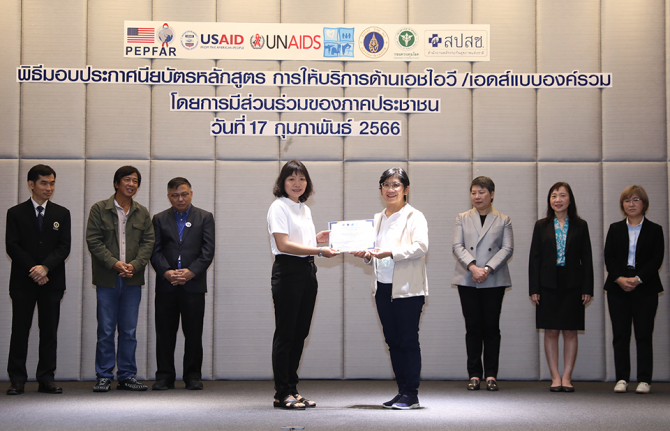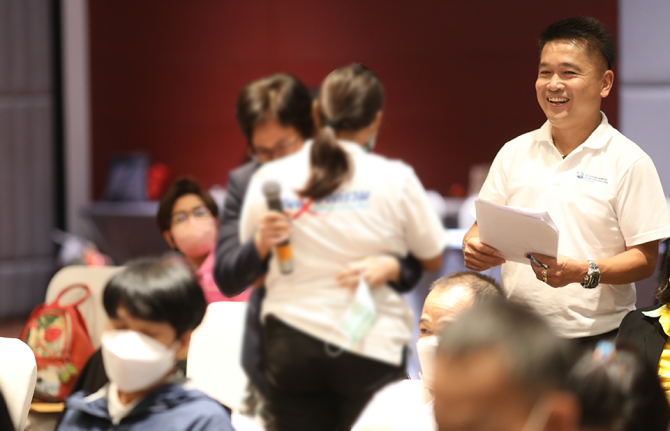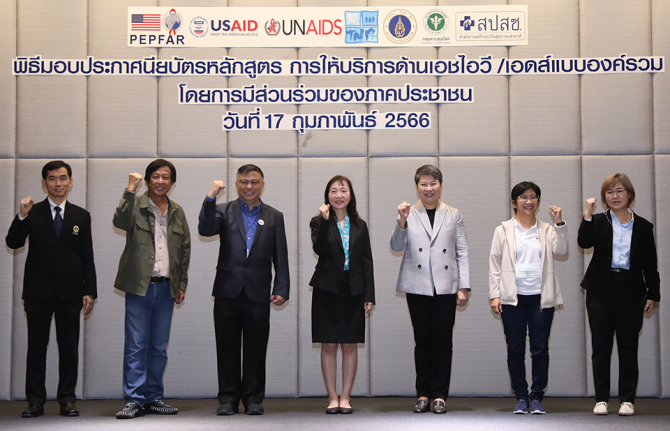



Feature Story
Thailand partners develop community-led HIV care curriculum
23 February 2023
23 February 2023 23 February 2023For 20 years Kochaphan Wangtan has been a community health worker, serving other people living with HIV (PLHIV) in Thailand.
“I’ve seen many friends living with HIV come to care very late with opportunistic infections,” she said.
“I focus on helping to bring them in and provide support to start antiretroviral treatment right away and I also conduct home visits, counselling and psychosocial screening so I can link them to services they need,” Ms Wangtan explained.
Ms Wangtan is from the Jai-Prasan-Jai Comprehensive Continuum of Care Center (CCC) from the Phan District Hospital in Chiang Rai province. She is one of almost one thousand PLHIV health workers who are embedded in more than 230 Thai hospitals and serve almost 60,000 PLHIV annually.
For the first time, the country has rolled out a national community health worker certification for these volunteers. The initiative is called “A Comprehensive Continuum of HIV/AIDS Care and Support for and by People living with HIV.” The curriculum was developed by the Ratchasuda College of the Mahidol University through close collaboration with the Thai Network of People Living with HIV/AIDS (TNP+) as well as support from the Health Ministry’s Division of AIDS and STIs and the National Health Security Office. USAID-PEPFAR via the III Unify Collaboration Programme and UNAIDS provided technical and financial support.
“PLHIV volunteers have provided the first community engagement in the HIV response since the start of the epidemic in Thailand,” said UNAIDS Country Director, Patchara Benjarattanaporn. “Peer-led support boosts treatment initiation and retention and is central to the HIV response,” she said. This initiative ensures that PLHIV-led health services are standardized, recognized and valued.
Two modules are delivered over 90 hours. The first module focuses on theoretical training, including on holistic follow-up care, treatment adherence counselling and developing a comprehensive service plan. The second module is practical. Along with its HIV focus, the curriculum also integrates tuberculosis, sexually transmitted infections, Hepatitis C and non-communicable diseases. Earlier in the month the first cohort of 46 PLHIV health workers received their certification.
Dr. Wachara Riewpaiboon, a rehabilitation physician and former Ratchasuda College Dean, developed the curriculum.
“The health system is not only for health professionals… It belongs to everyone,” she said. “Getting an HIV diagnosis does not help clients understand what they are facing. When people living with HIV tell their story, it is very different knowledge they are imparting. The knowledge that helps people make decisions for themselves usually comes from peers, not doctors.”
For her, care goes beyond medicine.
“It is not only biology that we are dealing with, but also psychology and our interaction with our social environment—how people look at people living with HIV and how they perceive themselves,” Dr Riewpaiboon continued. “It is very important to help people see the positive side of their experience.”
According to Nurse Chulaporn SingPae, an HIV Coordinator at the Phan District Hospital, PLHIV volunteers help with counselling, adherence, missed appointment follow-up, home visits, treatment deliveries, overcoming stigma including self-stigma and promoting understanding of U=U, undetectable equals untransmittable. (An undetectable viral load means the virus is not transmittable aka untransmittable.) The training ensures that these contributions are recognized by the health system as meeting quality standards.
Now that the course has been developed and tested, the curriculum has been recognized by the National Health Security Office (NHSO). Thai civil society organizations, who provide HIV and STI services with certified community health workers have been accredited and are eligible to register as health service units in the Universal Health Coverage scheme. Having supported the development and pilot of the curriculum, UNAIDS is now supporting a study to cost these services. The office is also working to promote sufficient and sustainable financing for community-led health services for PLHIV and key populations.
“This training is going to become the guarantee that a peer educator provides a high quality of service, in a holistic way, which encompasses not just the physical but also the mental, emotional and social aspects,” said Apiwat Kwangkeaw, Chairperson of the Thai Network of People living with HIV/AIDS. “As this becomes institutionalized, we are sending a message to the health system as a whole to let the community of peer educators be an equal partner,” he said. Mr Kwangkeaw hopes this will translate into sustainable domestic financing for community-led health services and better quality of life for PLHIV.



